What Does the Feast of Tabernacles Symbolize Spiritually
The Feast of Tabernacles, also known as Sukkot, symbolizes God’s provision and faithfulness, commemorating the Israelites’ 40-year journey in the wilderness when God sheltered them. It also points to the anticipated Messianic age, where peace and unity will prevail.
The Feast of Tabernacles is an annual Jewish festival celebrated on the 15th day of the Hebrew month of Tishrei. It lasts for seven days, with an eighth day called Shemini Atzeret.
Spiritually, it represents:
- Thanksgiving for the harvest
- Remembrance of the Israelites’ dependence on God during their desert wanderings
- A prophetic foreshadowing of the future Messianic kingdom
For example, the temporary shelters or ‘sukkahs’ built during Sukkot symbolize the transient dwellings used by the Israelites.
Key spiritual themes of Sukkot include:
- Gratitude: Celebrating the harvest and acknowledging God’s provision.
- Trust: Reflecting on the Israelites’ reliance on God in the wilderness.
- Joy: Rejoicing in God’s continuous protection and blessings.
- Hope: Looking forward to the coming of the Messiah and the peace He will bring.
Embracing the rich heritage of Sukkot, believers reflect on God’s enduring presence and the promise of renewal and redemption in their spiritual walk.
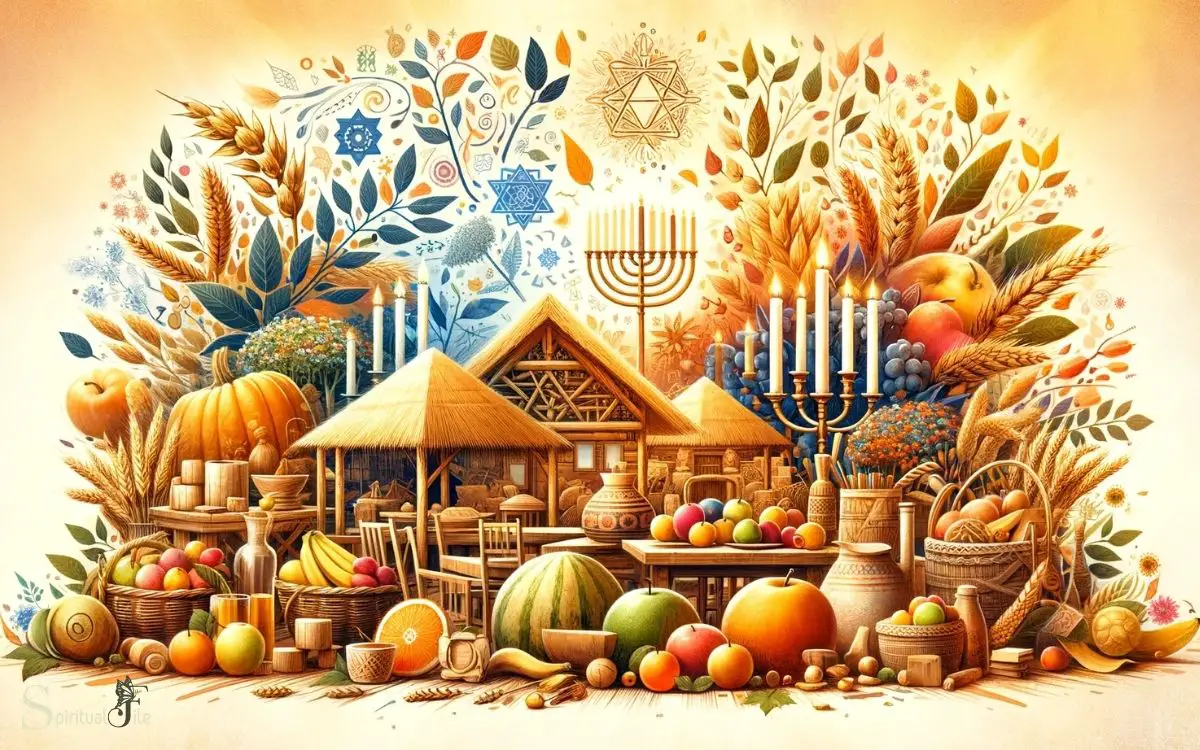
Key Takeaway
Historical Significance
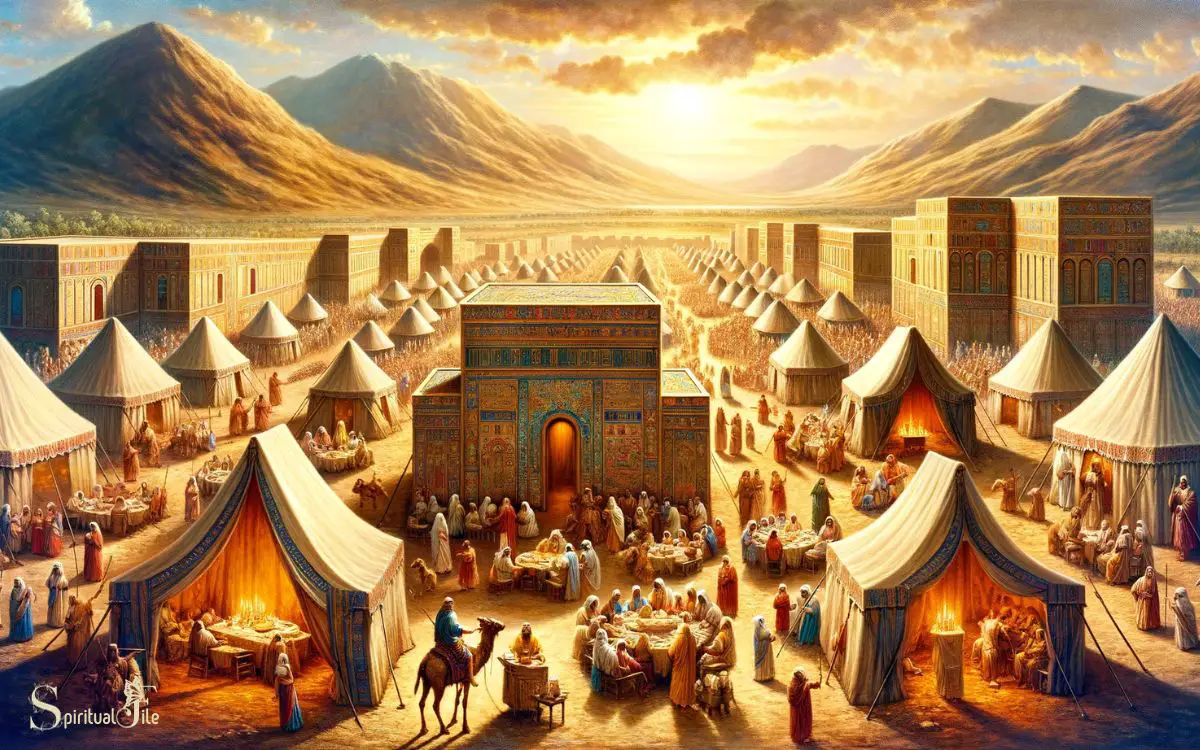
The historical significance of the Feast of Tabernacles is frequently overlooked in discussions of its spiritual symbolism. Yet, it plays a crucial role in understanding the festival’s deeper meaning.
Dating back to ancient times, this feast was a time of great rejoicing and thanksgiving for the harvest. It was also a commemoration of the Israelites’ exodus from Egypt and their journey to the Promised Land.
During this festival, people would dwell in temporary booths or tabernacles, symbolizing their reliance on God for protection and provision during their desert wanderings.
Understanding the historical context of this feast provides insight into the spiritual significance of relying on God’s faithfulness and provision.
It also helps us understand the joyous celebration of His blessings. Therefore, acknowledging the historical foundation of the Feast of Tabernacles enriches our understanding of its spiritual symbolism.
Temporary Dwellings
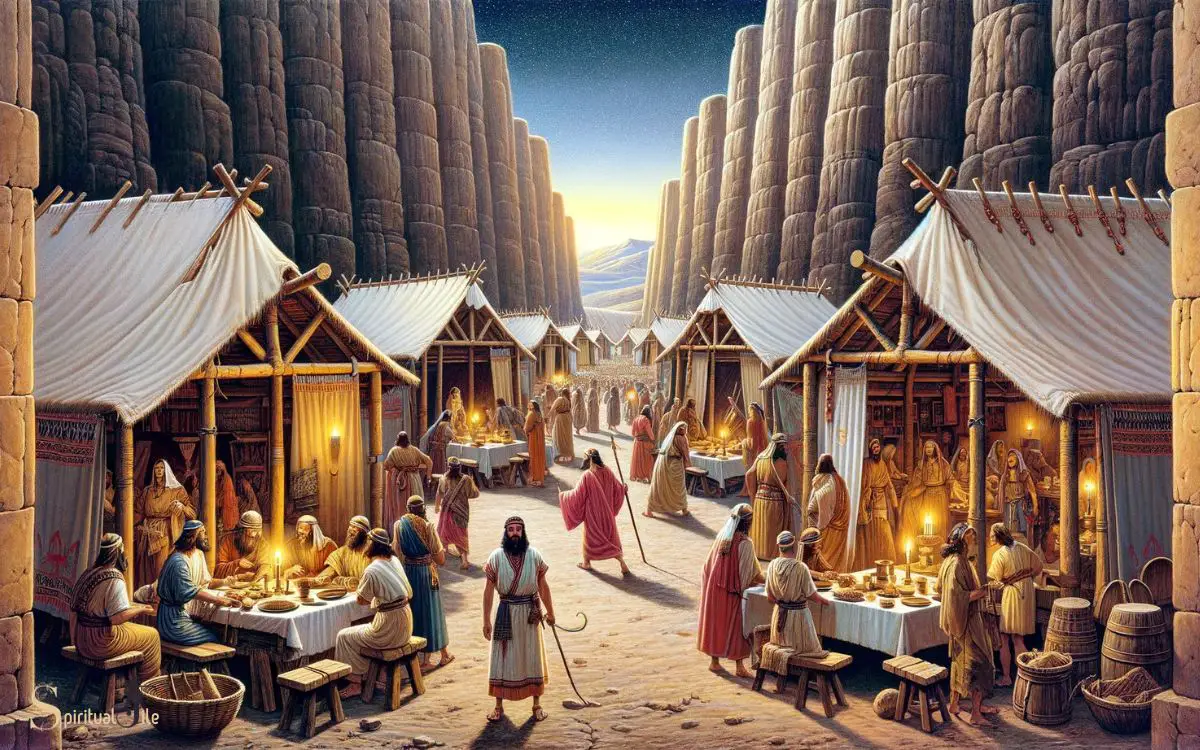
The concept of temporary dwellings during the Feast of Tabernacles holds deep spiritual symbolism. It represents the impermanence of life and the transient nature of earthly existence.
This tradition also connects practitioners to ancient rituals and traditions, fostering a sense of continuity and spiritual heritage.
Exploring the spiritual significance of these shelters provides insight into the deeper meaning of the Feast of Tabernacles. It helps us understand its relevance in contemporary spiritual practice.
Symbolism of Impermanence
Symbolizing impermanence, the temporary dwellings during the Feast of Tabernacles remind believers of the transient nature of earthly existence.
These temporary dwellings, known as sukkahs, are constructed with simple materials and are intentionally designed to be fragile and impermanent.
This symbolism serves as a powerful reminder that life on earth is fleeting and temporary. It encourages believers to reflect on the impermanence of material possessions and the ephemeral nature of human life.
The act of dwelling in these temporary structures for the duration of the feast serves as a tangible representation of the impermanence of life, prompting individuals to contemplate the deeper spiritual truths and prioritize the eternal over the temporal.
Ultimately, the symbolism of impermanence during the Feast of Tabernacles underscores the importance of seeking spiritual fulfillment and preparing for the everlasting life to come.
Connection to Ancient Traditions
Constructed with simple materials, sukkahs represent a connection to ancient traditions by serving as temporary dwellings during the Feast of Tabernacles.
The practice of building and dwelling in sukkahs dates back to biblical times, symbolizing the Israelites’ journey through the desert after the exodus from Egypt. It serves as a reminder of the temporary shelters they lived in during their travels.
This tradition also fosters a sense of humility and gratitude, as individuals experience firsthand the impermanence of material possessions and the reliance on a higher power for protection and sustenance.
The act of physically building and dwelling in a sukkah provides a tangible link to the past and reinforces the spiritual significance of the Feast of Tabernacles, connecting present-day observers to the enduring traditions of their ancestors.
Spiritual Significance of Shelters
During the Feast of Tabernacles, the spiritual significance of shelters as temporary dwellings is rooted in the historical journey of the Israelites through the desert after the exodus from Egypt.
This symbolism holds important spiritual meaning, representing the following:
- Dependence on God: The temporary shelters remind believers of their reliance on God’s provision and protection during challenging times.
- Humility and Gratitude: They serve as a reminder to remain humble and grateful for the blessings received, acknowledging that everything comes from the divine source.
- Transience of Life: The impermanent nature of the shelters reflects the fleeting nature of earthly life, emphasizing the eternal nature of spiritual existence.
- Unity and Community: The act of dwelling in temporary shelters fosters a sense of togetherness and solidarity among believers, promoting a communal bond.
As we delve into the spiritual significance of shelters, it becomes evident how this symbolism intertwines with the celebration of harvest.
Celebration of Harvest
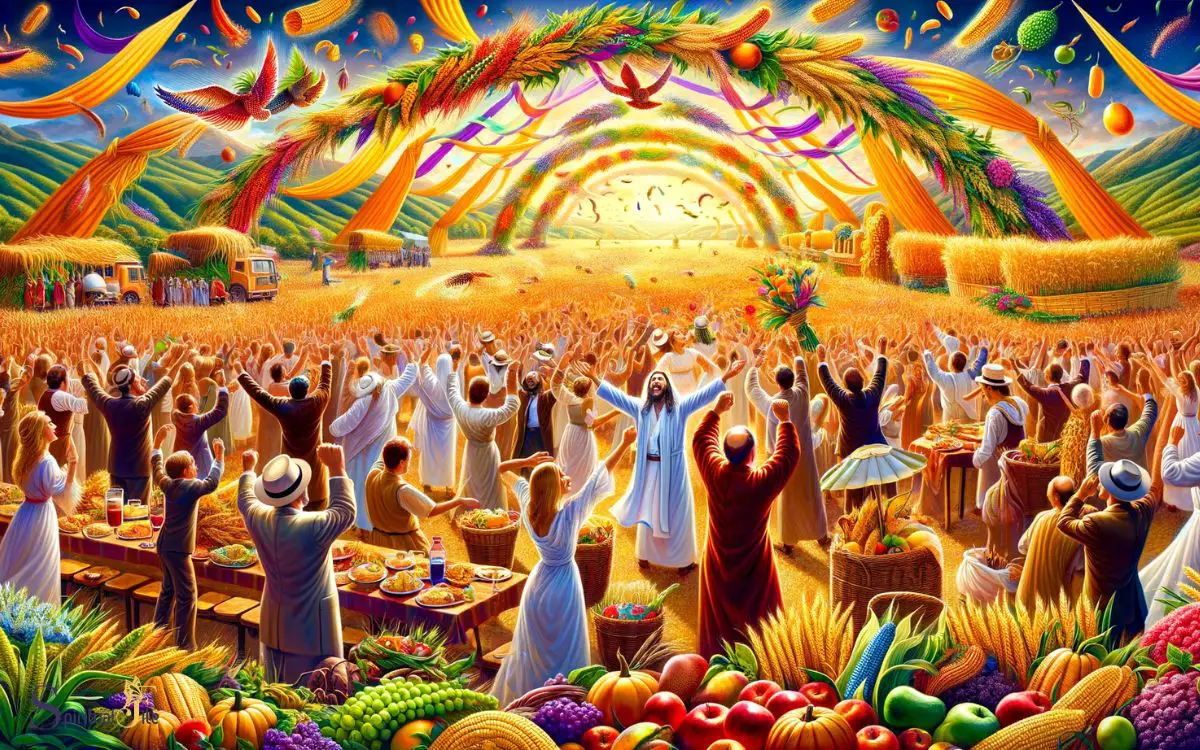
The Feast of Tabernacles symbolizes the celebration of harvest, emphasizing gratitude for the abundance of the earth’s produce.
This celebration holds deep spiritual significance, as it represents the culmination of the agricultural cycle and the provision of sustenance.
The act of gathering together to rejoice and give thanks for the harvest fosters a sense of community and unity, acknowledging the interconnectedness between humanity and the natural world.
It serves as a powerful reminder to express appreciation for the blessings of the land and the hard work that goes into cultivating it.
The Feast of Tabernacles thus becomes a time of reflection, gratitude, and recognition of the divine provision, encouraging individuals to be mindful of the abundance that surrounds them and to share with those who are less fortunate.
God’s Provision and Protection
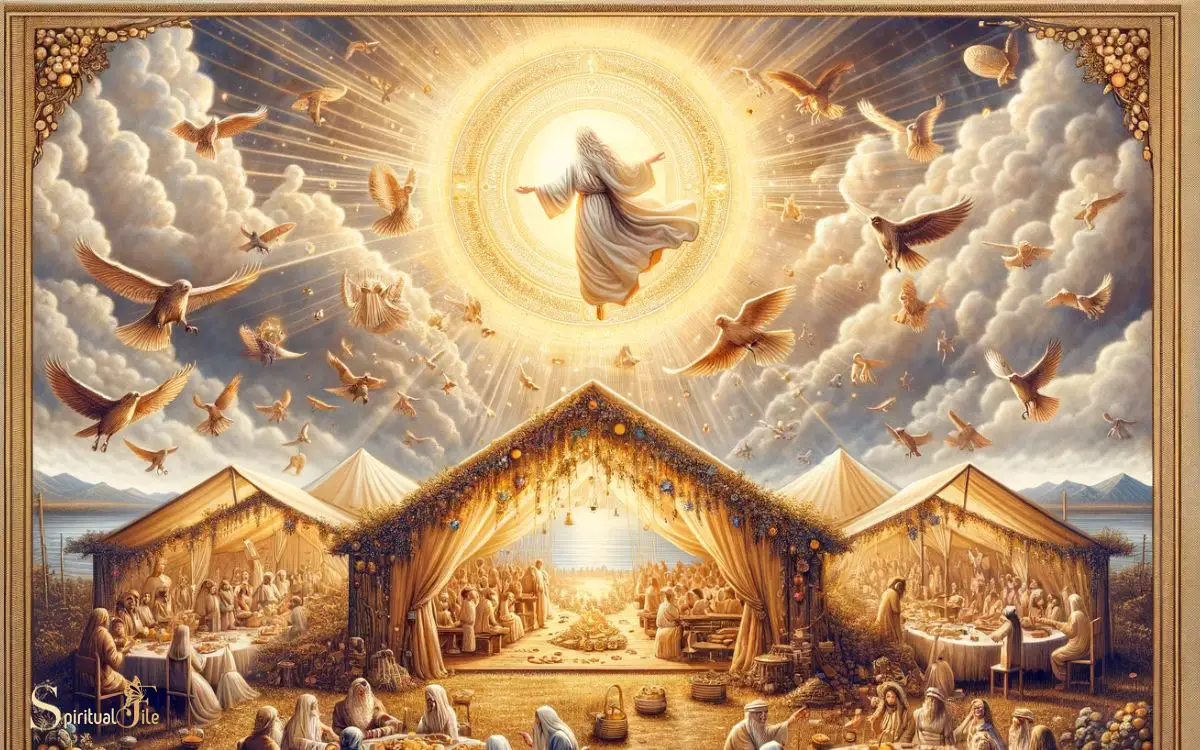
An important aspect of the spiritual symbolism of the Feast of Tabernacles is the divine provision and protection that it signifies. This festival represents God’s faithfulness in providing for His people and protecting them throughout their journey.
The following points highlight the significance of God’s provision and protection during the Feast of Tabernacles:
- God’s Provision: The Feast commemorates the Israelites’ reliance on God’s provision during their time in the wilderness.
- Harvest Blessings: It signifies the abundant harvest and blessings that God bestows upon His people.
- Divine Shelter: The tabernacles or booths constructed during the festival symbolize God’s protection and shelter over His people.
- Spiritual Nourishment: It serves as a reminder of God’s continuous provision of spiritual nourishment and sustenance for His followers.
During the Feast of Tabernacles, believers reflect on God’s enduring provision and protection throughout history, fostering a deeper sense of gratitude and trust in His faithfulness.
Unity and Community
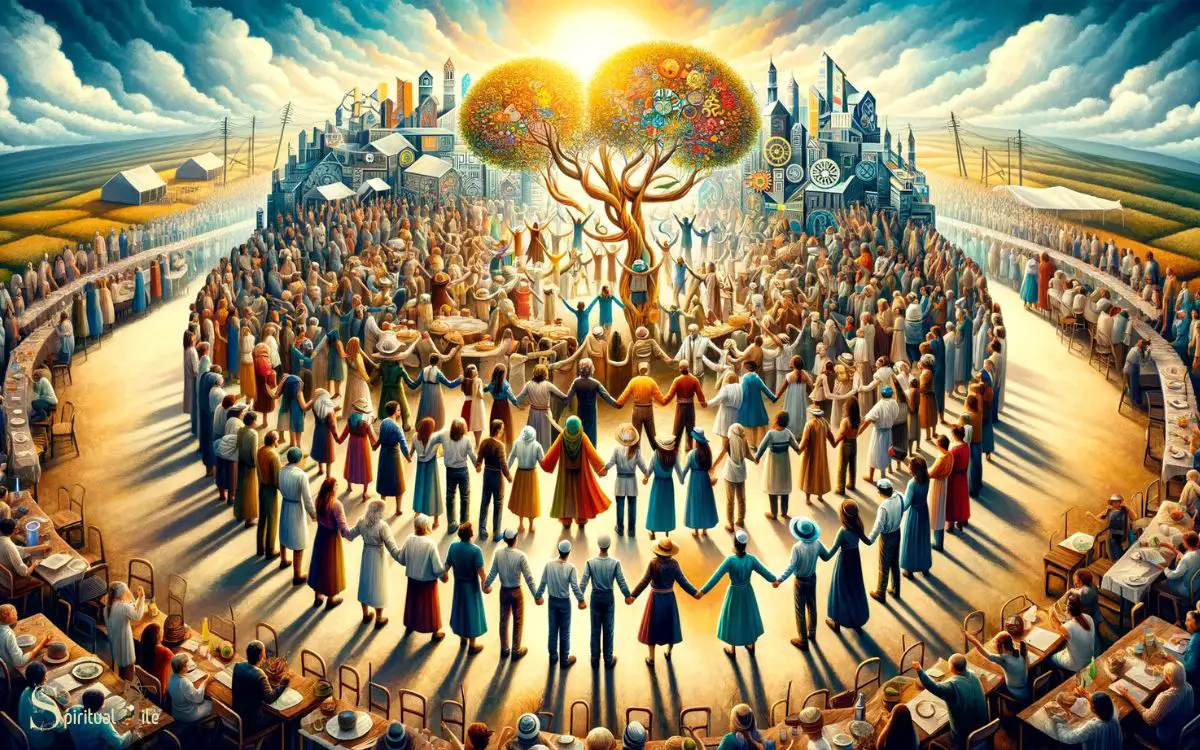
The Feast of Tabernacles holds great symbolic significance in its emphasis on unity and community. It represents a communal gathering where people come together to celebrate and worship, emphasizing the spiritual significance of togetherness and the unity found in faith.
This aspect of the feast serves as a powerful reminder of the importance of unity and community in our spiritual lives.
Symbolism of Communal Gathering
Communal gathering during the Feast of Tabernacles symbolizes the unity and interconnectedness of the spiritual community. It serves as a powerful representation of the shared values and beliefs that bind individuals together in their faith.
The symbolism of communal gathering can be understood through the following points:
- Unity: The coming together of individuals from diverse backgrounds illustrates the oneness and harmony within the spiritual community.
- Support: Communal gathering fosters an environment of mutual support and encouragement, emphasizing the importance of standing together in times of need.
- Shared Purpose: It highlights the shared purpose and mission of the spiritual community, reminding individuals of their collective journey towards spiritual growth.
- Fellowship: The communal gathering fosters a sense of fellowship, promoting strong relationships and a sense of belonging among members.
Spiritual Significance of Togetherness
Symbolizing the spiritual interconnectedness of believers, the Feast of Tabernacles underscores the profound spiritual significance of togetherness, emphasizing unity and community within the faith community.
This celebration serves as a powerful reminder of the importance of coming together in unity, reflecting the harmonious relationship between God and His people.
The spiritual significance of togetherness during the Feast of Tabernacles extends beyond physical presence, emphasizing the shared spiritual journey and mutual support within the community of believers.
It symbolizes the strength derived from communal worship, fellowship, and the collective pursuit of spiritual growth.
The togetherness experienced during this feast represents a powerful demonstration of the unity and love that should characterize the faith community, serving as a source of encouragement and inspiration for all believers.
Unity in Faith
Exemplifying the cohesive bond among believers, the concept of unity in faith during the Feast of Tabernacles reinforces the spiritual interconnectedness and communal strength of the faith community.
This unity in faith holds significant spiritual symbolism, emphasizing the following:
- Harmony: The Feast of Tabernacles fosters a sense of harmony among believers, promoting peace and understanding within the faith community.
- Solidarity: It signifies a collective commitment to shared beliefs and values, uniting individuals in their spiritual journey.
- Support: Unity in faith encourages mutual support and encouragement, creating a nurturing environment for spiritual growth and development.
- Witness: It serves as a powerful witness to the world, demonstrating the transformative power of faith and the unity it brings among believers.
Through these principles, the Feast of Tabernacles becomes a time for believers to come together in unity, strengthening their faith and community bonds.
Spiritual Renewal

The Feast of Tabernacles’ spiritual renewal emphasizes the individual’s connection to faith and inner transformation.
It is a time for believers to seek spiritual renewal, aligning themselves with the divine and experiencing personal growth. This period encourages introspection, repentance, and a deepening of one’s relationship with the divine.
The following table illustrates the key aspects of spiritual renewal during the Feast of Tabernacles:
- Spiritual Renewal during the Feast of Tabernacles
- Introspection and Self-Examination
- Repentance and Seeking Forgiveness
- Connecting with the Divine
- Inner Transformation
- Personal Growth and Renewal
During this time, individuals are encouraged to engage in self-reflection, seek forgiveness, and strive for personal growth and transformation.
Messianic Fulfillment

Emphasizing the Messianic fulfillment with a sense of continuity, the Feast of Tabernacles underscores the prophetic significance of the divine promise, signaling the awaited fulfillment of redemption and restoration.
This spiritual celebration symbolizes the anticipation of the Messiah’s coming and the establishment of His kingdom on earth.
The Messianic fulfillment during the Feast of Tabernacles is manifested through:
- The Dwelling of God: Signifying the presence of God among His people.
- The Harvest: Representing the gathering of believers into God’s kingdom.
- The Water Libation Ceremony: Foreshadowing the outpouring of the Holy Spirit.
- The Ultimate Restoration: Pointing towards the future restoration of all things through the Messiah.
This profound symbolism in the Feast of Tabernacles serves as a testament to the divine plan of redemption and the ultimate fulfillment through the Messiah.
How is the Symbolism of the Feast of Tabernacles Different from the Symbolism of a Seahorse?
The symbolism of the Feast of Tabernacles centers around the idea of temporary shelter and commemorating the Israelites’ time in the wilderness. In contrast, the seahorse spiritual symbolism of patience represents perseverance and calmness in the face of challenges. Both hold significant spiritual meanings, but the focus is on different aspects of faith and resilience.
Relevance to Believers Today

With its rich historical and spiritual significance, the Feast of Tabernacles holds enduring relevance for believers today through its connection to the Messianic hope.
This festival serves as a reminder of God’s faithfulness in the past, present, and future. As believers, it provides an opportunity to reflect on the ultimate fulfillment of this feast in the Messianic age, fostering hope and anticipation for the return of Christ.
The table below outlines the ways in which the Feast of Tabernacles remains relevant to believers today:
- Historical Connection: Reflecting on God’s faithfulness in the history of Israel
- Spiritual Growth: Fostering hope and anticipation for the return of Christ
- Community and Fellowship: Coming together to celebrate and worship, strengthening communal bonds
Conclusion
The Feast of Tabernacles holds great spiritual significance as it symbolizes historical events, the provision and protection of God, unity and community, and spiritual renewal.
It also points towards the Messianic fulfillment and holds relevance to believers today. The celebration of this feast serves as a reminder of God’s faithfulness throughout history and continues to be a time of spiritual reflection and renewal for those who observe it.






